
Like many punk labels, Council Records wasn’t entirely meant to happen. Instead, it was that time-honored by-product of independent musical life: friends in a band who got tired of stuffing their demo tape into envelopes and decided to take matters into their own hands. “Council initially formed to release Current records,” says label owner and former Current vocalist Matthias Weeks. “We put our demo out to a couple of labels that we respected, like Simple Machines and Sunspot. We didn’t really get any interest, but Simple Machines sent back a do-it-yourself guide [on] how to put a record out. Justin [Labo, guitar] and I looked at that and said ‘Let’s just do this ourselves, no one else is going to do it.’ We put that 7-inch out with no real intentions of being a record label. In fact, we didn’t really plan on doing the Current LP ourselves—Doghouse were interested, but we soured on that idea pretty quickly. None of us wanted to sign a contract, we just really wanted to keep it DIY. Our big push was to get that record out by the time we went on tour in the summer of ’93, and that wasn’t going to happen unless we did it ourselves. Once we had those two records out, it kinda felt like ‘Oh, I guess we’re doing this now. We’re a record label.’”
If the label’s early run of releases were modest in terms of number and parochial in terms of personnel—Current, Ottawa, and .NEMA all shared members, while tour buddies Chino Horde felt like siblings separated at birth—then the caliber was sky-high, bolstering the canon of ferocious, emotionally-intense ‘90s hardcore alongside labels like Ebullition, Stonehenge, and The Great American Steak Religion.
The collapse of Current in late 1994 led Weeks to cast a wider net with the label. “I think I always took the Dischord model to heart,” he chuckles. “I wanted to catalogue that southeast Michigan scene of the ‘90s, even the southwest to some degree with Ordination Of Aaron and Constatine Sankathi.” Moving to Arizona and then Chicago sent the label into a period of relative dormancy, but also provided spurs in terms of new friendships and new musical outlets. “A bunch of us moved into a house together and that was the beginning of Dearborn SS, New Granada, and eventually Calvary too. We had a huge apartment and two small apartments that were all filled with people we knew. Canadian Rifle started practicing there, Gus Martin, who was in Spirit Assembly and Encyclopedia Of American Traitors, lived there. We’d have bands practicing and staying over all the time–—that’s where I started getting really interested in putting records out again.”
Life, as it has a habit of doing, got in the way once again. Calvary folded, and Weeks found himself busier and busier with gaming convention AdeptiCon; he was initially disinclined to move the label into the digital realm. However, a new project—the blistering Wrong War—finally came together, while the COVID-enforced lockdown gave him time to remix, remaster, and digitize his earlier material. “I’d been talking to Derek [Brosch], the drummer from Current and Ottawa, and both he and I are kinda like archivists—we both have a ton of stuff from that era. He’d started trying to get the Current and Ottawa stuff online, and while I’d thought about that for a couple of years I also knew how much work it would be to track down good sources for some of this music. That’s the silver lining of COVID for me: that all of a sudden I had the time to figure out how to do this properly. My next thought was, Who was adjacent to the label? Michigan in the ’90s had a very vibrant scene and there were a lot of bands who were in danger of disappearing. What if we started doing a wider Council archive of bands that were adjacent to us and active in our sphere of influence during that time? So I just started reaching out, which was great because all of a sudden I’m talking to people I hadn’t spoken to in years. I started this process not even knowing how to make a record anymore, but I’m figuring it all out again. And once I started doing this I had people like Steve Roche from Off Minor who runs Permanent Hearing Damage and he was like ‘Hey, if you’ve got DATs [digital audio tapes], I’ve got a functioning DAT machine and can transfer to digital for you.’ That sort of stuff just took me back to the beginning of punk rock.”
Here are a few great intro points to the Council family.
Ottawa/Jihad
Split LP
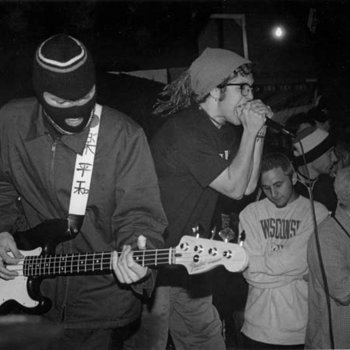

T-Shirt/Shirt

Despite being almost the same band, Ottawa were an entirely different beast to Current. Informed by a slavering mix of crust, grind, and powerviolence, the band was formed as a giant FUCK YOU—and it showed. “The Indian Summer/Current split got just fuckin’ destroyed in MRR,” says Weeks. “It got the shittiest review possible, and was basically the start of MRR saying ‘We’re not going to look at music like this anymore, it’s bullshit, your parents would like it.’ I think we talked to somebody on the phone at MRR about it, and they said something like punk rock was ‘three chords, fast, pissed off, and had at least one psycho in the band.’ We said, ‘We can fuckin’ do that!’ and 10 months or whatever later, the Ottawa/Jihad split is on all these top 10 lists in MRR. We only played six or eight shows, something like that. Technically we only played out of Michigan twice. We opened the ’94 More Than Music Fest Current set playing three Ottawa songs. And then Current was on tour and we were playing the Cop Out house in Memphis, and we just said ‘Man, there’s no way these guys want to hear Current’—you could just tell.”
While Weeks is enthusiastic about the newly remixed and remastered Ottawa material and the opportunity he’s had to correct some naïve mistakes, there’s still one youthful error that sticks in his craw. “Sadly we were really fucking stupid,” he sighs. “When we went in to record we were like ‘We can’t afford a new reel, record over the Current reels.’ So we recorded over Coliseum, which pains me to this day. We were able to remix all the early Current stuff and the final Current songs. But knowing we could’ve done service to Coliseum and not being able to, that hurts.”
Chino Horde
This is Done


Some 1500 kilometers away from the scene Current had been helping to build, Little Rock’s Chino Horde—and their File 13 imprint—were lighting similar fires. Ostensibly a melodic punk act, there was something particularly epic to the band’s sound that took them far beyond other acts cast from a similar Squirrel Bait-ish mold. “The last Chino Horde 7-inch was super important for me to be involved with,” says Weeks. “I think they had an ad in MRR and I ordered that two-song 7-inch. Popped it on and it was fuckin’ great. They had a contact number in there, or maybe it was in Book Your Own Fucking Life, and I called them and asked if they wanted to go on tour. I think I actually spoke to Mark Dober, who’d later on go on to be in The Shivering. Totally sight unseen, I think we sent them a few records. That was about it—we agreed to go on this 45-date tour and came out the other side friends for life.”
.NEMA
Bring Our Curses Home
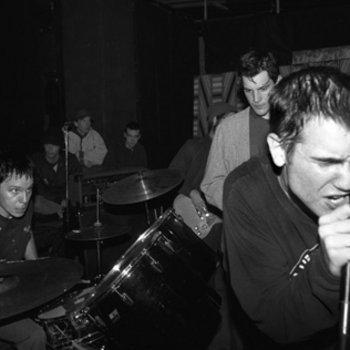

While the Ottawa/Jihad split was widely lauded, Weeks’ follow-up project continues to linger in the punk rock hinterlands—an odd and undeserved fate considering its savagery. “.NEMA was me transitioning from vocals to guitar, playing with Jeff [Rice] from Ottawa and Eric [Kane] from Abiology Records. At that point in time Jeff and I were all about grindcore and crust punk, and Eric was really into crusty, dirty metal,” Weeks says. “The early stages of the band were definitely rough—none of us were as good musicians as, say, the guys in Ottawa—but we were going for a sort of continuation of that sound. We were also becoming influenced by early Emperor and early Enslaved, so we were trying to bring some of that into hardcore. That band was 100% fun, and exactly what I needed after Current. Because Current was pretty serious by the time we broke up, but with .NEMA there was never any drama—we jokingly called it ‘.NEMA Summer Camp.’ We were never full-on—Eric and I even moved away in the middle of that band, I think we recorded the LP after I got back. There were long periods of time where we were inactive—for a band that was around for three years, we were off for nine months or something.”
Constantine Sankathi
Discography
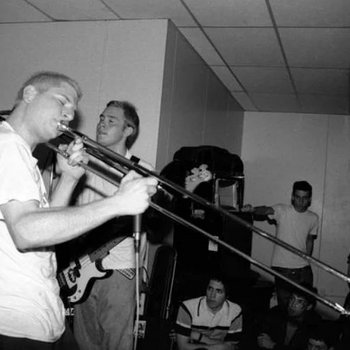

Of all the bands playing scratchy, sloppy, earnestly poetic music and packaging it in handmade sleeves, Constatine Sankathi were perhaps the oddest. A sad, shambling, brokedown mess of a band that sounded genuinely tortured, they’d veer haphazardly from tumbling blasts of speed, into patches of desperate beauty. “The song on the 26th comp was the only thing I ever did with them at the time but I was pretty good friends with the singer Joseph who was also in Bombs Lullabye,” says Weeks. “When I finished the Current CD discography, my next thought was to do one for Constantine. To me, they were the last great band of that era. I saw them play their last show at Goleta Fest and they broke up at that show. I felt like ‘That’s it. That’s the end of that Midwest, Michigan era of music for me.’ I always thought they were an amazing band. A little rough around the edges, but that was part of the charm. People gave ‘em shit over the trombone, but whatever—I think it works.”
Yaphet Kotto/Suicide Nation
Split EP


On paper, pairing the savage, ultra-metallic Suicide Nation with the pleading, righteously pissed political hardcore of Yaphet Kotto might seem like an odd choice. The results, though, were incendiary, and this joint release helped jump-start the next phase of Council’s evolution. “When I left Michigan I went to Arizona for a year,” says Weeks. “I met Mike [Genz] from King Of The Monsters and the guys from Unruh. Some of my favorite people in the world are Ryan [Butler] and Matt Martinez, who went on to be in Landmine Marathon and various other things, so this split was more about me knowing those guys. But around that time my relationship dissolved and I just wanted to get away for a bit, and my friend Dave was like ‘Hey, Yaphet Kotto’s going on tour, you should go with them…’ I didn’t even know those guys; I’d had really limited interaction with them. But I corresponded with Casey [Watson] a bunch over the split, and I asked what he thought about me jumping in the van with them. That was great, because I’d never traveled not being in the band. It really forged a relationship with the band and it got me reinvested in the label. Shortly thereafter Dearborn and New Granada came out; Calvary started; I made contact with Spencer and The Shivering and that cued up five or six releases for me.”
Calvary
Outnumbered is Outflanked
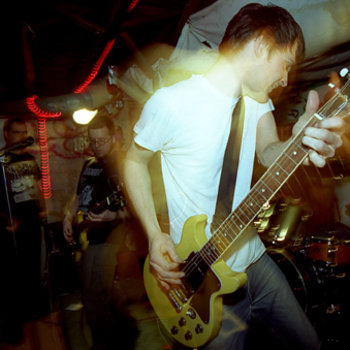
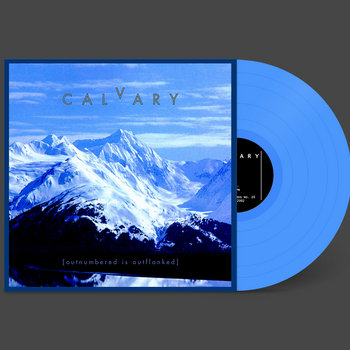



Vinyl LP



Calvary seemed almost to come out of nowhere, full of life and fully-formed. Proffering a vital mix of UK post-punk and Revolution Summer-style DC hardcore, the band followed a punchy demo with Outnumbered Is Outflanked, one of the great unsung punk records of the noughties. “Jeff [Rice, again] and I were super, super obsessed with Howard Devoto and Magazine. We’d been introduced to this guy, Matt Ryan, who’d just moved to Chicago to do some union organizing and he was involved in punk and just a great guitar player. We got him into John McGeoch, Magazine, and early Siouxsie And The Banshees, and he had a real knack for that style,” says Weeks. “We recorded the demo—it was 16-track, pretty rough, we didn’t do any real production on it: we just rolled the tape and let it go. For the LP, we got lucky—we recorded with Greg Norman in his home studio. He’s a very meticulous, old-school, all-tape guy. You go back and look at some of those records like Wire, or whatever, and there’s always a credit for some guy who made that sound happen. He wasn’t in the band, but he was some producer who really did it. In some ways Greg did that for us—he really got a sound out of us and helped us do some things we never would have thought of, like the Beatles-esque backward guitar solo on ‘Revenant.’ He was like, ‘You know what would be cool?’ and it was.”
The Shivering
Brand the Lion’s Mouth
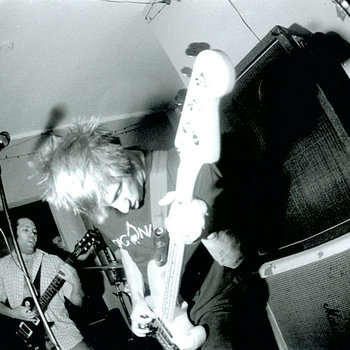
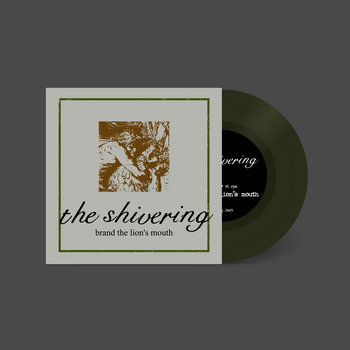

7" Vinyl

The early ‘00s saw a clutch of bands—The Pine, Sinaloa, Sundowner, Life At These Speeds—who found themselves swept up in the Orchid screamo boom but were more indebted to the sounds of labels like Repercussion, Inchworm, and Nervous Wreck Kids. Another, The Shivering, seemed like a perfect match for Council, hearkening back as they did to Current and Rites Of Spring while also featuring genetic ties to the earliest days of the label. “I wasn’t really that familiar with The Shivering when Spencer [Rangitsch, bass/vocals] originally reached out to me,” says Weeks. “I’m not sure if Mark Dober [Sint; Full Service Quartet] had joined the band at that point, but he was an old friend of mine from the Little Rock/Chino Horde era. And I also kinda knew Brian [Gathy], the guitar player, because Current played a few shows with his old band Junkdrawer. I put out that first 7-inch myself and the 10-inch and the second 7-inch were splits with Into The Hurricane and Owlsa. I love ‘em, and the shit that Spencer went on to do? Baader Brains, Mothercountry Motherfuckers… amazing.”
Wrong War
Fixed Against Forever
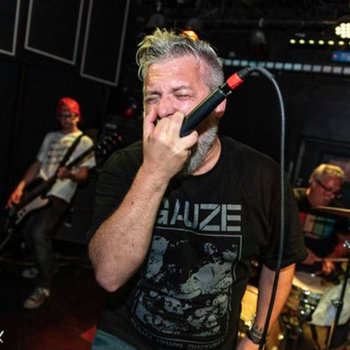
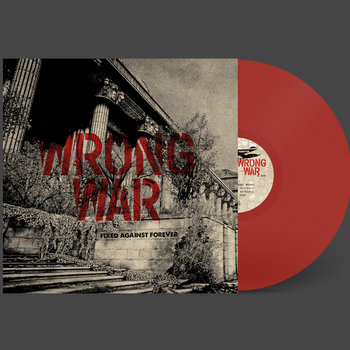






Vinyl LP, T-Shirt/Apparel, Sweater/Hoodie




Following the collapse of Calvary, Council once again fell into dormancy. Barring a couple of Halloween gigs playing covers of The Sound with some gaming buddies, Matthias was left wondering whether he might be out of gas musically, despite missing playing and creating music. The spur for his latest project—the ripping, Articles Of Faith-esque Wrong War—was another happy accident. “We bought a house and I hired a guy to do my windows,” says Weeks. “He comes over and takes a look at my record cabinet and Minor Threat or whatever was there, and we get talking and realize we know all the same people in Chicago. Somewhere down the road he said he was thinking about starting a band. At first I wasn’t sure I’d have the time or the creative spark but we gave it a shot. I think when Wrong War started those guys had no real intention of being an angry, pissed off political band. When I came to sing it was suddenly, ‘Oh whoa, this is gonna take a different direction…’ From the first few practices to when we actually recorded, it’s a pretty drastic shift. We all just fed off each other, and we all ended up pretty shocked with how it came out. Once that band started coming together we talked about putting a record out, and I was like ‘Maybe it’s a one-off, but what if we put this on Council?’”
Roosevelt’s Inaugural Parade
6-Song Demo


With just one and a half 7-inches to their name, Roosevelt’s Inaugural Parade were very much a blink-and-you’ll-miss-‘em slice of Michigan punk. Their obscurity was perhaps sealed thanks to the labels they fell in with; their nimble, jangly indie-emo seemingly at odds with the chunkier sounds of both Initial Records and the sketchy, bootleg-peddling Conquer The World. While their records can be turned up by anyone willing to spend time rooting through endless used bins, their first demo is a far harder item to uncover, and exactly the kind of artifact Weeks hopes to rescue with his archival efforts. “That’s really an unheard demo for a lot of people,” he says. “The 7-inch and split had a different singer, but the original Roosevelt’s singer was the second singer on the first Current 7-inch. I think 50 copies of that demo were made, and I couldn’t find any trace of it on the internet. But the reel somehow still existed and had gotten into the hands of Jeff Dean, who plays in Dead Ending. He reached out, and said he was going to remix it—it came out so good. Something like that is way more than an archival project, it’s the resuscitation of a recording that was pretty much lost to history.”
Inso Grey
Demo


One step more obscure was the Inso Grey demo, a band most ‘famed’ for appearing on a Food Not Bombs benefit comp alongside the likes of Palatka, Constatine Sankathi, and Anomie for Gord Dufresne’s pre-Deranged label, Anima. “When I started doing the archive stuff, Rich [Miles], who played bass in Constantine, was like, ‘What about the Inso Grey demo?’ I remembered them from the comp and knew the demo but I didn’t really know much else. I reached out to Andy [from Inso Grey], and they didn’t have much. That demo didn’t even have a cover—I think it came in a burlap sack or something. They came out of that Constantine wave in Kalamazoo, and that band, like bev.clone, made perfect sense for what I imagined the archive project to be,” Weeks says. Rough-hewn as the seven tracks are, there’s a taut, beleaguered sense of urgency to them that immediately grabs attention—a fraughtness that should sit perfectly with those who know their Don Martin 3 and Shroomunion records inside out. “There’s a lot of bands like that,” says Weeks of the unheard and uncataloged records that he’s keen on breathing life back into. “There was a band from Detroit called Grout who I’d love to do but I can’t get in touch with the guys. Then there was another band called The Vice whose demo I think could be cool to do—it sounded like early Shades Apart, and featured the drummer from Orange 9mm before he moved out to New York. There are lots of things like that, and I’m doing what I can to track them down.”







